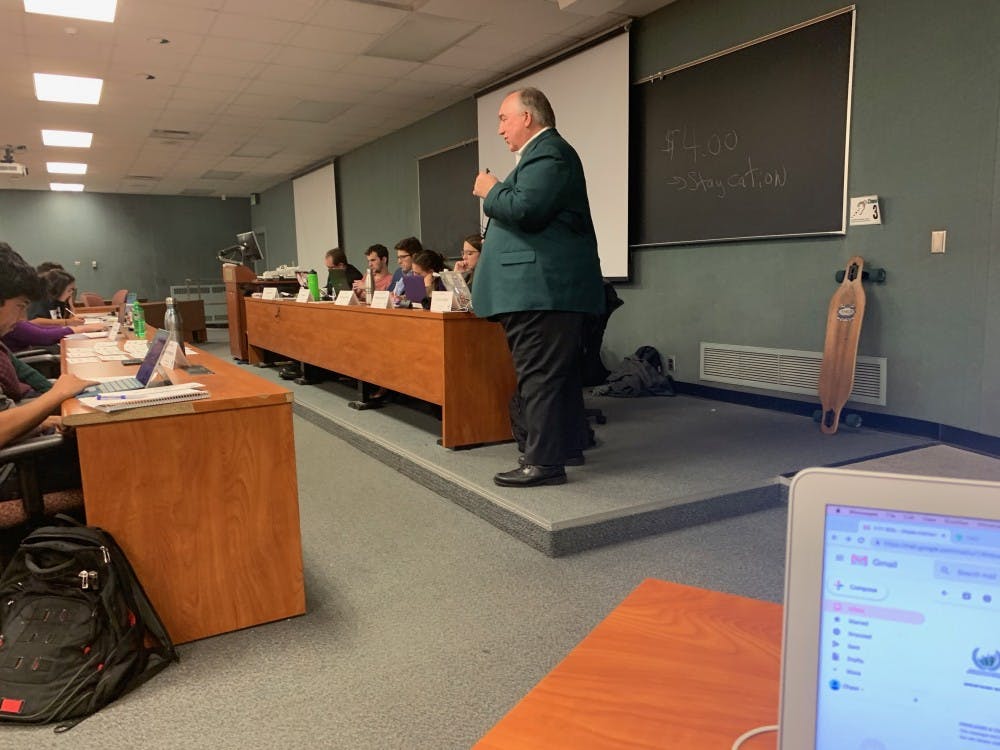MSU Interim President John Engler attended the Associated Students of Michigan State University's, or ASMSU's, general assembly meeting Thursday night. After giving a short presentation about new buildings on campus, Engler participated in about a 40-minute question-and-answer session with the members of the general assembly.
Among the topics that were raised to Engler were block tuition, the tuition differential for business and engineering students and the university’s response to the current sexual assault crisis on campus. Multiple times, Engler cut students off during their questions to challenge their assertions.
Multiple students asked about the change to tuition structure beginning in the 2019-20 academic year. Block tuition will charge all full-time students not in the Business College or Engineering College the same rate regardless of the number of credits they are taking–$7,230 for incoming freshmen taking between 12 and 18 credits for a semester.
“As you know, there’s been a big effort underway on campus to try to encourage graduation in four years, thus reducing the cost of college and (allowing graduates to) get out there earning money,” Engler said. “We think it’s a very positive thing."
Ben Horne, the vice chairman of ASMSU’s policy committee and a representative of the Lyman Briggs College, was vocally unhappy with the decision to switch to block tuition. He asked why ASMSU had not been consulted.
“The transition period here we are woefully unprepared for,” Horne said. “There are about 200 university policies that need to go through academic governance, and they have not yet. (ASMSU) has not really been consulted throughout the entire process when it largely affects undergraduates.”
Horne and Engler had a discussion about whether block tuition should happen at the university, with Engler ending the discussion by saying, “The decision to go to block tuition has been made. You need to help on the implementation, and I hope you will.”
Business and engineering students already pay slightly more than students in other colleges– currently, the difference is $18 per credit hour for upperclassmen in addition to a $226 fee for Business College students and a $670 fee for Engineering College students.
Engineering representative Ryan Aridi and Business representative Gabriella Winters both asked questions about why students in the Business College and Engineering College must pay more tuition. Aridi called his constituents “cash cows.”
“The differential with business and engineering really is something that many, many schools already have had. We’ve had it here, and it reflects, frankly, the success that those engineering and business school graduates are gonna have,” Engler said. “There is tremendous demand for these programs as well. The price point hasn’t been a deterrent at all into the pursuit of entry into those colleges and acquiring those degrees.”
Winters objected to this premise. She said just because the university can charge certain students more does not mean they should.
“In your economics course, they would talk about supply and demand. There’s great demand for the business school and the engineering school, and an oversupply,” Engler said.
Veterinary Medicine representative Lauren Pepper raised concerns about the university’s incentive to end a culture she believes does not actively discourage sexual assault among the university’s athletic teams and the Greek community on campus.
“In the sports teams and the incentives surrounding them, often reports are suppressed because players make money, so I’m wondering what concrete oversight measures are being implemented,” Pepper said. “I’m asserting that the sports institutions actively threaten people who want to come forward with sexual assault accusations.”
Engler said he believes the university has made progress in this regard, citing the Office of Institutional Equity's (OIE's) increased budget and staff size, as well as the fact that more assaults are being reported this year since the new campaign has started.
Though Engler did not directly address the athletic teams and Greek community specifically, MSU spokesperson Emily Guerrant later clarified there have been and will continue to be specific outreach programs into the athletic department and Greek community.
Engler was also asked about college affordability and the shift in the burden of payment from state budgets to individuals. He said universities like MSU, which have decided to freeze tuition, should get more state funding.
“We submitted a budget request which was approved by the Board at the last meeting, and we’re asking in that budget request of the legislature in the fiscal year, that there be recognition given to schools who have held the line on tuition,” Engler said. “That is the policy that the legislature and the governor have said for many years was important to them. We’re saying there oughta be some recognition in the funding formally if you (freeze tuition).”
Engler left the meeting upon the conclusion of his question-and-answer session.
Support student media!
Please consider donating to The State News and help fund the future of journalism.
Discussion
Share and discuss “Engler appears at ASMSU General Assembly meeting, answers questions” on social media.








